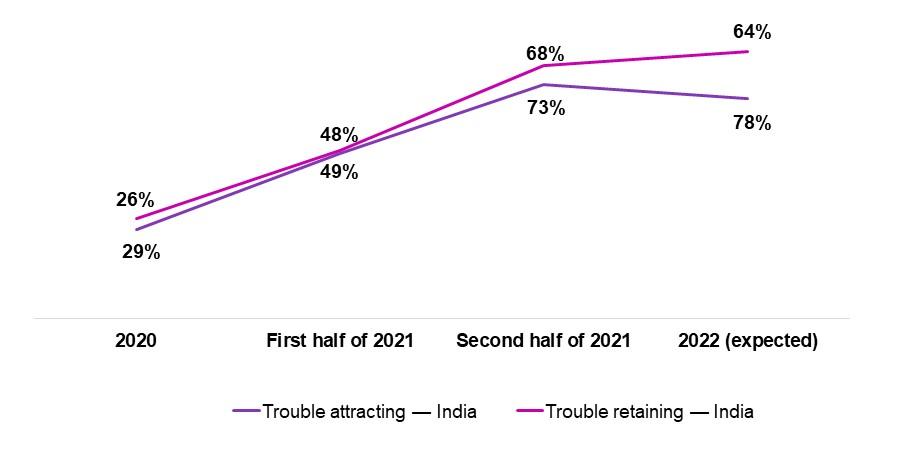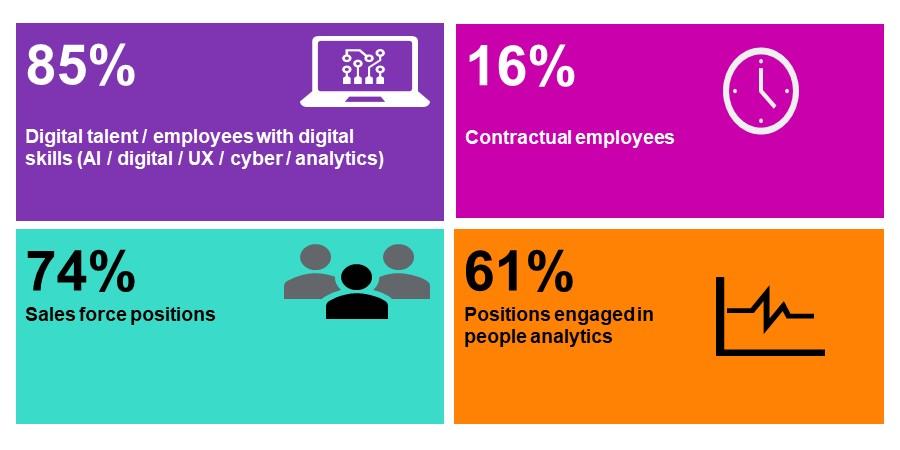NEW DELHI, July 5, 2022 — The India findings of a new global survey by WTW (Willis Towers Watson, NASDAQ: WTW), a leading global advisory, broking and solutions company, reports that talent challenges across all employee categories are expected to continue in 2022. Specifically, 78% organisations in India are experiencing talent attraction challenges this year, with 64% facing pressure in retaining employees.
The WTW Reimagining Work and Rewards Survey reveals that over the past two years, the number of organisations in India experiencing difficulties attracting and retaining talent has increased manifold. While fewer employers reported problems attracting (29%) and retaining (26%) talent in 2020, these figures rose to 68% and 73% respectively in the second half of 2021. While the retention figure dropped slightly in 2022 to 64%, companies facing talent attraction challenges are expected to grow to 78%.


In addition, 85% of employers cited challenges in attracting or retaining digital talent while 74% reported a similar challenge with positions in sales. Similarly, those in markets such as Singapore (84%), Philippines (77%) , Hong Kong (75%), Japan (71%) and China (60%) also face a challenging task in attracting or retaining employees with digital skills.
Asked when they expect the pandemic to recede enough so that the organisation reaches its 'new normal' in terms of staff returning to the workplace and ending temporary pandemic-related policies and procedures, 54% of the respondents indicated that they were not there yet. In fact, 12% expect that they will reach a new normal state only in 2023 or even later.
In terms of flexible work arrangements, the survey finds that the proportion of employees who worked primarily remotely or with a mix of onsite and offsite is up 54% now compared to 7% of employees three years ago. As many as 47% are expected to remain in a primarily remote-hybrid mode in three years time.
“Companies in virtually every industry are now under significant pressure to adapt to a new business environment and sweeping workforce changes,” said Rajul Mathur, Consulting Leader India, Work and Rewards, WTW. “Businesses need to prioritise employee retention and re-examine business practices that lead to turnover to tackle ongoing pressure points they face in retaining and attracting talent.”
According to the survey, the top factors that will drive change in an organisation's ways of working over the next three years are:
Organisations recognise that addressing these areas will require new capabilities in HR. More than half (58%) of employers indicate that the capability to build new strategies around work and rewards is one of the most important. Sixty-one percent of organisations also see a need to create a human-centric, holistic and purpose-driven employee experience, and 58% indicates the need to build a talent ecosystems that encompass alternative work models.
In terms of total rewards, employers in India are expected to take the following key actions:
“Companies need to take tangible actions to win the talent war. These include resetting their Total Rewards philosophy and strategy for the new hybrid work environment, setting an overarching career enablement strategy, identifying new sources of talent based on more flexible approaches to work and resdesigning jobs. Organisations need to look for ways to build a sustainable work and rewards model with long-term prospects for both employees and the company itself. The more attractive a company is to its employees, the more they will recommend it as a great place to work,” added Mathur.
At WTW (NASDAQ: WTW), we provide data-driven, insight-led solutions in the areas of people, risk and capital. Leveraging the global view and local expertise of our colleagues serving 140 countries and markets, we help organizations sharpen their strategy, enhance organizational resilience, motivate their workforce and maximize performance.
Working shoulder to shoulder with our clients, we uncover opportunities for sustainable success — and provide perspective that moves you.